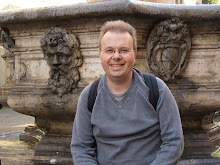BBC Breakfast had for once interesting item this morning about full body scanners which are being rushed into operation at Heathrow along with sniffer dogs and doubtlessly other methods of terrorist detection. I have to say that I m not a fan of BBC Breakfast. At any other time of the day BBC News 24 is a very good source of news. In the morning, however, it is full of fluff and my preferred choice is Euronews or CNN. But getting back to the item- Lots of people were interviewed and they all without exception were happy to have scans of their nude bodies examined provided hey did not show up on the internet. The only dissenter was a man in the studio from a civil liberties organisation who asked the pertinent question of what liberties are we actually defending if we need to have pictures taken if our genitals to safeguard it.
No doubt the majority of the audience thought he was a crank and will fall back to the usual rhetoric of ‘If you have nothing to hide you have nothing to fear’ and ‘The more security we have the more secure we will be’.
However, let’s examine some of these ideas in more detail. First the idea that people who have done nothing wrong have nothing to fear. Try telling that to the people who have been incarcerated for years I Guantanamo Bay without any rights and in most cases without any charges being made against them. Or the people who have been kept under house arrest in the U.K. without being told who their accusers are or what evidence there is against them. Or the alleged perpetrators of the chemical vest plot who had their whole house systematically demolished looking for materials that have never been found. Could this happen to you? If you think that it couldn’t then why?
How many of you reading this would think twice about putting up a blog posting like this in case it put you on the security radar or upset somebody who had power over you? If it would give you a moment’s pause then you must realise that you no longer live in a society as free as you used to. If terrorists are trying to undermine our way of life then we seem to be hell bent on making sure they succeed.
Similar justifications are used in the increasing use of police checking of people who work with vulnerable people. The terrible murder of Holly and Jessica was used as a justification for increased use of police checks for people who work with vulnerable people and children. However, Holy and Jessica’s murderer did not have a Police record. In fact, he would have been prevented from getting a job as a school janitor by a much more low tech form of checking. If his new employer had asked for a reference he would not have been able to obtain a satisfactory one. Similarly, the person who tried to blow up a plane over the holidays could have been stopped using existing intelligence. He had been reported to the authorities by his own father who was concerned by his extreme views and behaviour. Conversely, the equipment being installed at Heathrow may not have been able to detect the type of explosives he was carrying. The intelligence that this man was dangerous was already there but was ignored. On Christmas Eve the Pope was attacked by a woman suffering from mental illness at the Mass at St Peter’s. Apparently the same woman had attempted this last year. Why was she allowed into the church? Surely security staff would have seen her photograph as part of their briefing. Why didn’t she get the psychiatric help she needed after she did it the first time?
Police checking and body scanners are appealing because they turn security into a procedure. They look good because we appear to be doing something. Something magic will happen inside the computer which will keep us safe provided we have faith in the technology. If it doesn’t work we just need better technology or better Police checks.
Here’s a better suggestion for making us more secure. Lets try changing how we engage with rest of the world. Redeploy the money spent on war in the middle east into helping people there and in countries like Haiti. Use the information we have at the moment wisely rather than abdicating our responsibilities to computer databases and new forms of snooping. Try to make the image we convey to the rest of the world in synch with how we would like to portray ourselves.
Now, wouldn’t that make you feel more secure?
Subscribe to:
Post Comments (Atom)

No comments:
Post a Comment